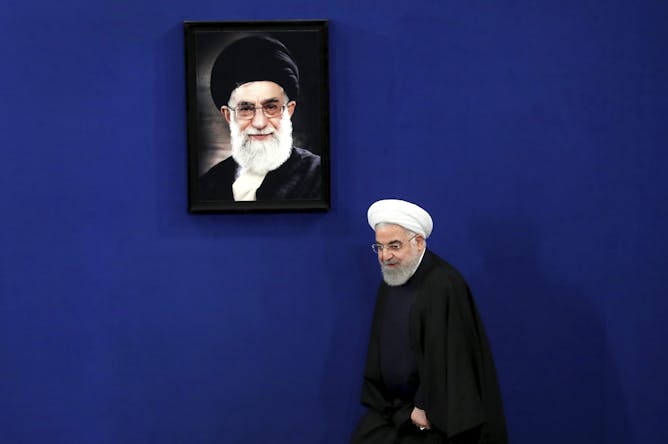|
Tensions between Iran and the United States have existed for decades, but the situation became increasingly more complex when former U.S. president Donald Trump pulled out of the Iran nuclear deal. The accord was the signature foreign policy achievement of his predecessor, Barack Obama, and Trump’s abandonment isolated the United States from its western allies. Not surprisingly, Joe Biden — Obama’s former vice president — campaigned on rejoining the deal.
But as James Devine of Mount Allison University writes today in The Conversation Canada, Biden hasn’t acted yet – and he’d be wise to do so soon given upcoming Iranian elections that could put hardliners in positions of power. By delaying, Devine writes, “Biden is trading a relatively quick foreign policy win for a much more perilous path.”
Also today:
Regards,
|

Iran’s President Hassan Rouhani arrives for a news conference in Tehran, Iran, in February 2020, with a portrait of the Supreme Leader Ayatollah Ali Khamenei hanging on the wall behind him. Both men have signalled an interest in a new nuclear deal.
(AP Photo/Ebrahim Noroozi)
James Devine, Mount Allison University
Joe Biden has said he wants to return the United States to the Joint Collective Plan of Action, also known as the Iran nuclear deal.
But the window of opportunity may be closing.
|

Digital health technology, such as electronic health records, is believed to enhance patient-centred care, improve integrated care and ensure financially sustainable health care.
(Shutterstock)
Linying Dong, Ryerson University; Karim Keshavjee, University of Toronto
Digital health can improve care, but in Ontario, health data are still fragmented, despite billions of dollars spent over the last two decades to enable fast and secure exchange of health information.
|

Avian cholera is a highly contagious disease that has produced rapid population loss in Northern common eiders.
(Shutterstock)
Mark Forbes, Carleton University
We can learn about the spread of diseases through populations by studying naturally occurring instances of herd immunity. Avian cholera in the Canadian Arctic provides a useful case study.
|

Monuments are good; so are civic festivals. The ‘plague column’ at Piazza San Domenico Maggiore, in Naples.
(Mongolo1984/Wikimedia Commons)
Keith Johnston, Algoma University
As the one-year anniversary of the World Health Organization’s declaration of a pandemic approaches, it might be time to consider how our modern age wants to remember this plague.
|
La Conversation Canada
|
-
Michel Jébrak, Université du Québec à Montréal (UQAM); Jack-Pierre Piguet, Université de Lorraine; Yann Gunzburger, Université de Lorraine
Le fer combat l’anémie. Le bismuth soulage les problèmes gastriques. Le lithium agit contre la dépression et l’or peut traiter la polyarthrite rhumatoïde… les métaux sont précieux pour la santé.
|
|

Ocean giants.
Marek Stepan/Alamy Stock Photo
John Virdin, Duke University; Henrik Österblom, Stockholm University; Jean-Baptiste Jouffray, Stockholm University
As few as 100 companies produced 60% of revenues in eight ocean industries in 2018.
|
COVID-19
|
-
William G. Bain, University of Pittsburgh; Georgios D. Kitsios, University of Pittsburgh; Tomeka L. Suber, University of Pittsburgh
A year after it became clear that COVID-19 was becoming a pandemic, there is still no cure, but doctors have several innovative treatments. Some are keeping patients out of the hospital entirely.
|
|
Education
|
-
Calvin Schermerhorn, Arizona State University
Are reparations for slavery enough for colleges to make amends? A scholar argues that access and student loan debt must also be addressed.
|
|